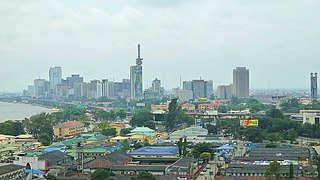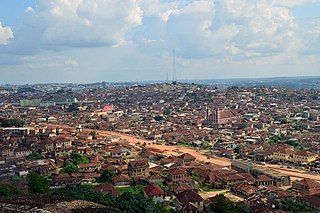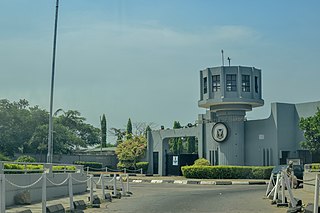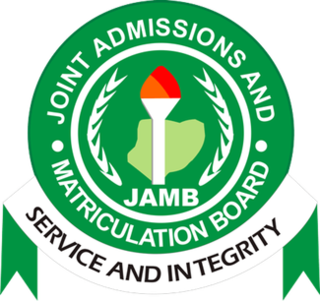
Lagos, or Lagos City, is a large metropolitan city in southwestern Nigeria. With an upper population estimate of 21 million, it is the largest city in Nigeria, and the most populous urban area on the African continent. Lagos was the national capital of Nigeria until the government's December 1991 decision to move their capital to Abuja in the centre of the country. Lagos is a major African financial centre and is the economic hub of Lagos State and Nigeria at large. The city has a significant influence on commerce, entertainment, technology, education, politics, tourism, art, and fashion in Africa. Lagos is also among the top ten of the world's fastest-growing cities and urban areas. A megacity, it has the fourth-highest GDP in Africa, and houses one of the largest and busiest seaports on the continent. Due to the large urban population and port traffic volumes, Lagos is classified as a Medium-Port Megacity.
The University of Alaska Southeast is a public university with its main campus in Juneau, Alaska and extended campuses in Sitka and Ketchikan. It is part of the University of Alaska System and was established on July 1, 1987, with the restructuring and consolidation of the former University of Alaska Juneau, Ketchikan Community College, and Islands Community College (Sitka). The university is accredited by the Northwest Commission on Colleges and Universities.

Lagos State is a state in southwestern Nigeria. Of the 36 Nigerian states, it is the second most populous state but the smallest in area. Bounded to the south by the Bight of Benin and to the west by the international border with Benin for 10 km, Lagos State borders Ogun State to the north for about 283 km, making it the only Nigerian state to border only one other state. Named for the city of Lagos—the most populous city in Africa—the state was formed from the Western Region and the former Federal Capital Territory on 27 May 1967.

Ogun State is a state in southwestern Nigeria. As a Nigerian state, Ogun is the second most industrialised state after Lagos, with a focus on metal processing. It has good road and rail connections to the harbours in Lagos and Lekki. Wole Soyinka, winner of the Nobel Prize for Literature 1986, lives in Ogun.

Yaba is a suburb located on Lagos Mainland, Lagos in Lagos State, Nigeria. With its educational institutions and technological start-ups, Yaba is considered the technological hub of Lagos. Inaugurated in 2021, the ultra-modern Mobolaji Johnson Central Station in Yaba connects Lagos with the country's third largest city, Ibadan, via one of the few standard-gauge railway lines in Africa. The bus station in Yaba stands out with its tent-like architecture. Yaba's market, especially around Tejuosho, is known as "the shopping centre of Lagos".

King's College, Lagos (KCL) is a secondary school in Lagos, Lagos State, Nigeria. It was founded on 20 September 1909 with 10 students on its original site at Lagos Island, adjacent to Tafawa Balewa Square. The school admits only male students although historically some female HSC students were admitted before the establishment of Queen's College Lagos, popularly known as King's College's sister school. King's College conducts exams for the West African School-Leaving Certificate and the National Examinations Council.

The University of Ibadan (UI) is a public research university in Ibadan, Nigeria. The university was once a college of the University of London. The college was established in 1948 as University College Ibadan, one of many colleges within the University of London. It became an independent university in 1962 and is the oldest degree-awarding institution in Nigeria. Through its graduate network, the University of Ibadan has contributed to the political, industrial, economic and cultural development of Nigeria.

Pukyong National University is a national university in Busan, South Korea, formed in 1996. The university has two campuses, Daeyeon-dong and Yongdang-dong, situated near the coastal district of Nam-gu. PKNU has a traditional focus on fisheries sciences and other maritime fields, and has extensive facilities for Marine and Technology studies.

Education in Nigeria is overseen by the Federal Ministry of Education. The local authorities take responsibility for implementing state-controlled policy regarding public education and state schools. The education system is divided into Kindergarten, Primary education, Secondary education, and Tertiary education. Nigeria's federal government has been dominated by instability since declaring independence from Britain, and as a result, a unified set of education policies is yet to be successfully implemented. Regional differences in quality, curriculum, and funding characterize the education system in Nigeria. Currently, Nigeria possesses the largest population of out-of-school learning youths in the world. The educational systems in Nigeria are divided into two the public where the student only pays for Parents Teachers Association (PTA) while the private where students pay school fees and some other fees like sports, exam fees, computer fees etc. and they are costly

The Joint Admissions and Matriculation Board (JAMB) is a Nigerian entrance examination board for tertiary-level institutions. The board conducts Unified Tertiary Matriculation Examination for prospective undergraduates into Nigerian universities. The board is also charged with the responsibility to administer similar examinations for applicants to Nigerian public and private monotechnics, polytechnics, and colleges of educations. All of these candidates must have obtained the West Africa Senior School Certificate (WASSCE) conducted yearly by the West African Examinations Council, WAEC, or its equivalent, National Examination Council (Nigeria), Senior School Certificate Examination, NECO SSCE.

Ladoke Akintola University of Technology (LAUTECH) is a public research institution located in Ogbomoso, Oyo State, Nigeria. The university enrolls over 30,000 students and employs more than 3,000 workers including contract staff.

Yaba College of Technology, popularly known as YABATECH, was founded in 1947, and is Nigeria's first higher educational institution. It is located in Yaba, Lagos. As of 2008, it had a student enrollment of over 16,000. It also has a secondary school and a staff primary school.
The Maritime Academy of Nigeria Oron, Akwa Ibom State was formerly known and address as the Nautical College of Nigeria was established in 1977 by the Federal Executive Conclusion No. EC(77) 172 with assistance from the International Maritime Organisation (IMO). It was established as a training institution under the Research and Statistic Department of the Federal Ministry of Transport. It was declared open for classes on the 6th of October 1979. The academy was originally designed as an integrated institution for the education and training of shipboard officers and ratings and shore-based management personnel.

Ajayi Crowther University is a private, faith-based university located in Oyo State, Nigeria.
Ignatius Ajuru University of Education, (IAUE) is a Nigerian university, it was previously known as Rivers State College of Education from June 1971- October 2009.

The Federal College of Education (Technical), Akoka is a Nigerian technical tertiary institution located in Akoka, a suburb of Yaba in Lagos. Founded in 1967 by the Federal Government of Nigeria, the institution was founded with the aim of "grooming and producing teachers in technical, vocational and commercial academic disciplines". The Federal College of Education (Technical), Akoka is approved by the National Universities Commission and offers the award of Nigeria Certificate in Education (NCE) and undergraduate first degree courses in technology education, having affiliated to the Federal University of Technology, Minna.
Federal College of Education (Special), Oyo also known as FCE OYO was established on 5 October 1977, as Federal Advanced Teacher's college (Special). The institution, according to a UNDP/UNESCO 1996 report (NIR/87/008) "... Has the best qualify Staff in Special Education not only in Nigeria but in West, North, East and Central Africa." The College is the only one of its kind in Nigeria and sub-Saharan Africa. It has the largest conglomeration of disabled students that could be found in any Higher Institution in Nigeria and the largest concentration of specialized facilities for teaching and training of teachers of the Handicapped in Nigeria. During its 40th anniversary celebration, the college gave special recognition award to former President Olusegun Obasanjo whose military administration brought about the upgrading of the Institution from the then Federal Advanced Teachers College to a College of Education with the mandate to award the National Certificate of Education (NCE) in 1977.

The Delta State University of Science and Technology is a Public University in Ozoro, Delta State.

The Federal College of Education (Technical), Asaba is a federal government Higher Education institution located in Asaba City, Delta State, Nigeria. It is affiliated to University of Benin (Nigeria) for its degree programmes. The College began in 1987 at the former Asaba Technical College, (ATC) at its temporary site. Asaba is a rapidly developing Urban Centre and the administrative headquarters of Delta State. Currently, the Provost of the Federal College of Education (Technical), Asaba is Josephine Anene-Okakwa.

Federal College of Horticultural Technology is a government-owned tertiary institution of learning located at Dadin Kowa, Yamaltu Deba local government area of Gombe state, Nigeria.
















